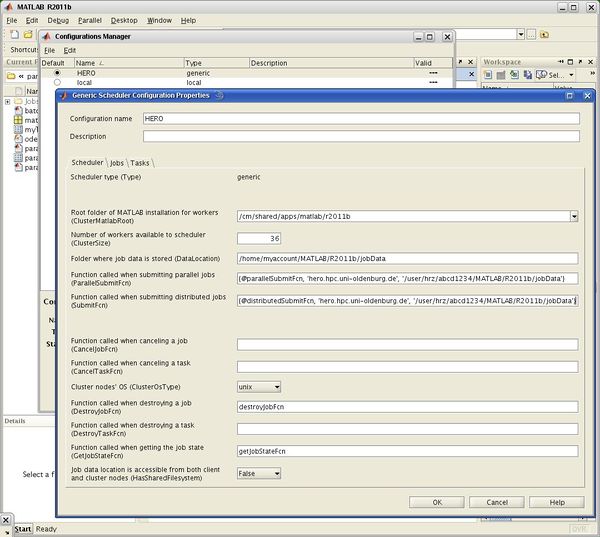Difference between revisions of "MATLAB Distributing Computing Server"
From HPC users
Jump to navigationJump to search
| Line 8: | Line 8: | ||
# On your local machine (PC, workstation, notebook, ...), one of the following MATLAB releases (including in particular, the '''Parallel Computing Toolbox''') must be installed:<br>R2010b<br>R2011a<br>R2011b | # On your local machine (PC, workstation, notebook, ...), one of the following MATLAB releases (including in particular, the '''Parallel Computing Toolbox''') must be installed:<br>R2010b<br>R2011a<br>R2011b | ||
# You must install a couple of files into the directory<br><tt>''matlabroot''/toolbox/local<br></tt> (on a Unix/Linux system, analogously for Windows clients) | # You must install a couple of files into the directory<br><tt>''matlabroot''/toolbox/local<br></tt> (on a Unix/Linux system, analogously for Windows clients) | ||
# After these preparations, select ''Parallel'' -> ''Manage Configurations'' and create a new "Generic Scheduler" Configuration:<br>[[Image:GenericSchedulerConfig.jpg|671px|600px]] | # After these preparations, select ''Parallel'' -> ''Manage Configurations'' and create a new "Generic Scheduler" Configuration:<br><br>[[Image:GenericSchedulerConfig.jpg|671px|600px]]<br> | ||
== Old (non-MDCS) MATLAB usage == | == Old (non-MDCS) MATLAB usage == | ||
Revision as of 14:07, 30 April 2013
Benefits of MDCS
Prerequisites
- On your local machine (PC, workstation, notebook, ...), one of the following MATLAB releases (including in particular, the Parallel Computing Toolbox) must be installed:
R2010b
R2011a
R2011b - You must install a couple of files into the directory
matlabroot/toolbox/local
(on a Unix/Linux system, analogously for Windows clients) - After these preparations, select Parallel -> Manage Configurations and create a new "Generic Scheduler" Configuration:

Old (non-MDCS) MATLAB usage
To submit a MATLAB job, you must first load the environment module in your submission script:
module load matlab
This automatically loads the newest version, if several versions are installed. After that, invoke MATLAB in batch mode:
matlab -nosplash -nodesktop -r mymatlab_input
where mymatlab_input.m (a so-called ".m-file") is an ASCII text file containing the sequence of MATLAB commands that you would normally enter in an interactive session.
Slides and links from last MATLAB workshop at the University of Oldenburg (19.02.2013)
Slides
Links
- Parallel-Computing Toolbox
- Distributed Computing Server
- Distributed Computing Server Webinars
- Material for Academia